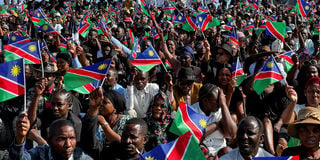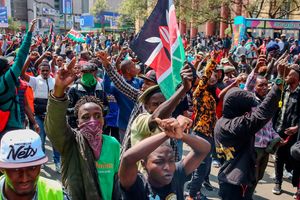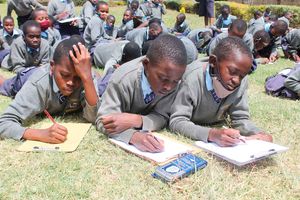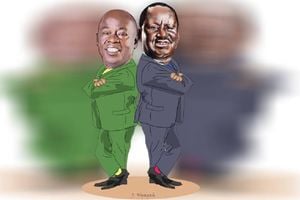
Namibians gather to pay last respects to late President Hage Geingob at Heroes Acre in Windhoek, Namibia February 25, 2024.
Last weekend, I had the privilege of attending the state funeral of President Hage Geingob, the fallen Namibian independence era stalwart. Though this wasn’t my first visit to the vast south-west African country, for some reason I reflected more on the nation than in previous trips.
For some perspective, Namibia is 825,000 square kilometers while Kenya is 580,000 km2 – which is a huge difference. Its population is 2.8 million to Kenya’s 52 million.
But this is the kicker – while its GDP is much smaller, its per capita income is $5,000, more than double that of Kenya. While these are the hard facts, it’s the soft ones that truly etch an indelible impression on any African visitor.
While Namibian infrastructure from highways and byways to city planning and immaculate construction are a marvel, it’s the country’s “software” that stands out on the continent. I have been to virtually all countries in Africa and many across the globe. You can sense a country’s “essence” upon landing at the airport and taking the usual ride to the city.
You immediately know whether you’ve arrived at a mismanaged, corrupt, and godforsaken country, or a desirable destination. It’s the looks on faces of the natives and their deportment. The aggressive demands for bribes from the immigration officer, conman taxi driver at the arrivals section, or pot-holed forlorn road to the city.
Like most African states, Namibia was a creation of the so-called Scramble for Africa by European imperialist thieves. Germany took it over in 1884 and between 1904 and 1908 committed the first genocide of the 20th Century by brutal massacres of the Herero and the Nama. German rule ended after defeat by South Africa in 1915 during the so-called First World War.
In 1920, after the ended, the League of Nations mandated Namibia to be a colony of South Africa, itself a racist state. From 1948, the National Party of South Africa formally turned Namibia into an apartheid state.
But under SWAPO, the gallant liberation movement, Namibia became independent in 1990. SWAPO’s Sam Nujoma became the country’s first Black leader.
Apartheid South Africa refused to hand over Walvis Bay, the strategic coastal area, to the new Black-ruled state of Namibia. However, upon its ascension to power and the end of formal apartheid, Nelson Mandela’s African National Congress retuned Walvis Bay to Namibia. There were obvious deep-seated economic and social inequities because of the legacy of colonialism and apartheid. Namibia’s Black population suffered heavily under those two traumas.
But Namibia has made many strides in improving the lot of its people. The first obligation of an African post-colonial elite was to establish a broadly legitimate political state. Most failed in this daunting task. Namibia, the driest country in Africa, established an exemplary democracy from the ashes of apartheid.
Namibia hadn’t experienced the death of a president until this month. Former President Nujoma, the founding president who is 95, is still living as is his successor, Hifikepunye Pohamba.
While the previous two handed over power peacefully after their term limits expired, Mr Geingob died in office, testing Nambia’s resilience for the peaceful and democratic transfer of power.
Festus Mbandeka, the erudite Attorney General, narrated to me the fluid, transparent, and democratic manner in which Vice President Nangolo Mbumba, the second Vice President, was sworn in as President after Mr Geingob’s death. President Mbumba, 82, has declared that he won’t be standing for a full term.
On a continent plagued by coups, dictatorships, and bad governance, Namibia’s swift and smooth transition coming after the previous two others, stands as a shining example for Africa. Some analysts of democratic practice think that three peaceful and democratic handovers of power are the irreducible minimum to establish the rhythms of a functional democratic culture. In that respect, Namibia is among the first pack in Africa.
During my visits to the country, I have gotten the distinct impression that their democracy is working and is broadly legitimate among the people, in spite of the challenges of development.
I want to close this piece by reflecting on the “social hygiene” and the orderliness in Namibia. Refuse, also known as garbage, is simply absent from the streets in Namibia. Traffic rules and ethics are followed to the last letter. Vehicles stop and go on their turn when the light changes, not before. Remarkably, I didn’t see a boda boda or tuk tuk, the two most primitive abominations on Kenyan roads. Cruising the streets of Windhoek, one can be forgiven for thinking that it’s a city in the Global North.
How did we lose it Kenya, and can we ever recover? Where’s the late John Michuki?
Makau Mutua is SUNY Distinguished Professor and Margaret W. Wong Professor at Buffalo Law School, The State University of New York. @makaumutua.










